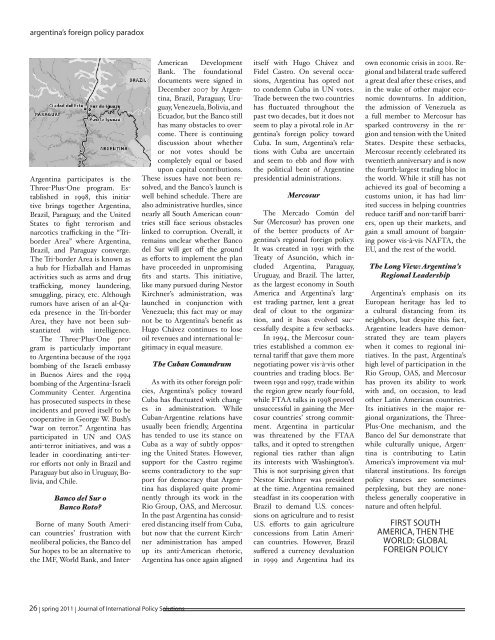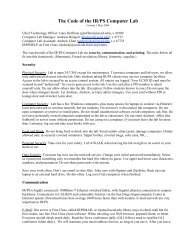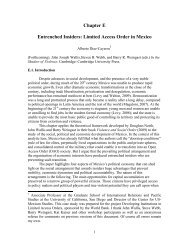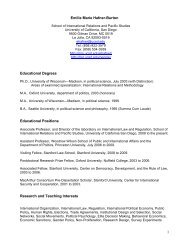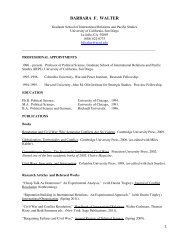to download the full journal. (1.2MB PDF) - School of International ...
to download the full journal. (1.2MB PDF) - School of International ...
to download the full journal. (1.2MB PDF) - School of International ...
Create successful ePaper yourself
Turn your PDF publications into a flip-book with our unique Google optimized e-Paper software.
argentina’s foreign policy paradox<br />
Argentina participates is <strong>the</strong><br />
Three-Plus-One program. Established<br />
in 1998, this initiative<br />
brings <strong>to</strong>ge<strong>the</strong>r Argentina,<br />
Brazil, Paraguay, and <strong>the</strong> United<br />
States <strong>to</strong> fight terrorism and<br />
narcotics trafficking in <strong>the</strong> “Triborder<br />
Area” where Argentina,<br />
Brazil, and Paraguay converge.<br />
The Tri-border Area is known as<br />
a hub for Hizballah and Hamas<br />
activities such as arms and drug<br />
trafficking, money laundering,<br />
smuggling, piracy, etc. Although<br />
rumors have arisen <strong>of</strong> an al-Qaeda<br />
presence in <strong>the</strong> Tri-border<br />
Area, <strong>the</strong>y have not been substantiated<br />
with intelligence.<br />
The Three-Plus-One program<br />
is particularly important<br />
<strong>to</strong> Argentina because <strong>of</strong> <strong>the</strong> 1992<br />
bombing <strong>of</strong> <strong>the</strong> Israeli embassy<br />
in Buenos Aires and <strong>the</strong> 1994<br />
bombing <strong>of</strong> <strong>the</strong> Argentina-Israeli<br />
Community Center. Argentina<br />
has prosecuted suspects in <strong>the</strong>se<br />
incidents and proved itself <strong>to</strong> be<br />
cooperative in George W. Bush’s<br />
“war on terror.” Argentina has<br />
participated in UN and OAS<br />
anti-terror initiatives, and was a<br />
leader in coordinating anti-terror<br />
efforts not only in Brazil and<br />
Paraguay but also in Uruguay, Bolivia,<br />
and Chile.<br />
Banco del Sur o<br />
Banco Ro<strong>to</strong>?<br />
Borne <strong>of</strong> many South American<br />
countries’ frustration with<br />
neoliberal policies, <strong>the</strong> Banco del<br />
Sur hopes <strong>to</strong> be an alternative <strong>to</strong><br />
<strong>the</strong> IMF, World Bank, and Inter-<br />
American Development<br />
Bank. The foundational<br />
documents were signed in<br />
December 2007 by Argentina,<br />
Brazil, Paraguay, Uruguay,<br />
Venezuela, Bolivia, and<br />
Ecuador, but <strong>the</strong> Banco still<br />
has many obstacles <strong>to</strong> overcome.<br />
There is continuing<br />
discussion about whe<strong>the</strong>r<br />
or not votes should be<br />
completely equal or based<br />
upon capital contributions.<br />
These issues have not been resolved,<br />
and <strong>the</strong> Banco’s launch is<br />
well behind schedule. There are<br />
also administrative hurdles, since<br />
nearly all South American countries<br />
still face serious obstacles<br />
linked <strong>to</strong> corruption. Overall, it<br />
remains unclear whe<strong>the</strong>r Banco<br />
del Sur will get <strong>of</strong>f <strong>the</strong> ground<br />
as efforts <strong>to</strong> implement <strong>the</strong> plan<br />
have proceeded in unpromising<br />
fits and starts. This initiative,<br />
like many pursued during Nes<strong>to</strong>r<br />
Kirchner’s administration, was<br />
launched in conjunction with<br />
Venezuela; this fact may or may<br />
not be <strong>to</strong> Argentina’s benefit as<br />
Hugo Chávez continues <strong>to</strong> lose<br />
oil revenues and international legitimacy<br />
in equal measure.<br />
The Cuban Conundrum<br />
As with its o<strong>the</strong>r foreign policies,<br />
Argentina’s policy <strong>to</strong>ward<br />
Cuba has fluctuated with changes<br />
in administration. While<br />
Cuban-Argentine relations have<br />
usually been friendly, Argentina<br />
has tended <strong>to</strong> use its stance on<br />
Cuba as a way <strong>of</strong> subtly opposing<br />
<strong>the</strong> United States. However,<br />
support for <strong>the</strong> Castro regime<br />
seems contradic<strong>to</strong>ry <strong>to</strong> <strong>the</strong> support<br />
for democracy that Argentina<br />
has displayed quite prominently<br />
through its work in <strong>the</strong><br />
Rio Group, OAS, and Mercosur.<br />
In <strong>the</strong> past Argentina has considered<br />
distancing itself from Cuba,<br />
but now that <strong>the</strong> current Kirchner<br />
administration has amped<br />
up its anti-American rhe<strong>to</strong>ric,<br />
Argentina has once again aligned<br />
itself with Hugo Chávez and<br />
Fidel Castro. On several occasions,<br />
Argentina has opted not<br />
<strong>to</strong> condemn Cuba in UN votes.<br />
Trade between <strong>the</strong> two countries<br />
has fluctuated throughout <strong>the</strong><br />
past two decades, but it does not<br />
seem <strong>to</strong> play a pivotal role in Argentina’s<br />
foreign policy <strong>to</strong>ward<br />
Cuba. In sum, Argentina’s relations<br />
with Cuba are uncertain<br />
and seem <strong>to</strong> ebb and flow with<br />
<strong>the</strong> political bent <strong>of</strong> Argentine<br />
presidential administrations.<br />
Mercosur<br />
The Mercado Común del<br />
Sur (Mercosur) has proven one<br />
<strong>of</strong> <strong>the</strong> better products <strong>of</strong> Argentina’s<br />
regional foreign policy.<br />
It was created in 1991 with <strong>the</strong><br />
Treaty <strong>of</strong> Asunción, which included<br />
Argentina, Paraguay,<br />
Uruguay, and Brazil. The latter,<br />
as <strong>the</strong> largest economy in South<br />
America and Argentina’s largest<br />
trading partner, lent a great<br />
deal <strong>of</strong> clout <strong>to</strong> <strong>the</strong> organization,<br />
and it hsas evolved success<strong>full</strong>y<br />
despite a few setbacks.<br />
In 1994, <strong>the</strong> Mercosur countries<br />
established a common external<br />
tariff that gave <strong>the</strong>m more<br />
negotiating power vis-à-vis o<strong>the</strong>r<br />
countries and trading blocs. Between<br />
1991 and 1997, trade within<br />
<strong>the</strong> region grew nearly four-fold,<br />
while FTAA talks in 1998 proved<br />
unsuccessful in gaining <strong>the</strong> Mercosur<br />
countries’ strong commitment.<br />
Argentina in particular<br />
was threatened by <strong>the</strong> FTAA<br />
talks, and it opted <strong>to</strong> streng<strong>the</strong>n<br />
regional ties ra<strong>the</strong>r than align<br />
its interests with Washing<strong>to</strong>n’s.<br />
This is not surprising given that<br />
Nes<strong>to</strong>r Kirchner was president<br />
at <strong>the</strong> time. Argentina remained<br />
steadfast in its cooperation with<br />
Brazil <strong>to</strong> demand U.S. concessions<br />
on agriculture and <strong>to</strong> resist<br />
U.S. efforts <strong>to</strong> gain agriculture<br />
concessions from Latin American<br />
countries. However, Brazil<br />
suffered a currency devaluation<br />
in 1999 and Argentina had its<br />
own economic crisis in 2001. Regional<br />
and bilateral trade suffered<br />
a great deal after <strong>the</strong>se crises, and<br />
in <strong>the</strong> wake <strong>of</strong> o<strong>the</strong>r major economic<br />
downturns. In addition,<br />
<strong>the</strong> admission <strong>of</strong> Venezuela as<br />
a <strong>full</strong> member <strong>to</strong> Mercosur has<br />
sparked controversy in <strong>the</strong> region<br />
and tension with <strong>the</strong> United<br />
States. Despite <strong>the</strong>se setbacks,<br />
Mercosur recently celebrated its<br />
twentieth anniversary and is now<br />
<strong>the</strong> fourth-largest trading bloc in<br />
<strong>the</strong> world. While it still has not<br />
achieved its goal <strong>of</strong> becoming a<br />
cus<strong>to</strong>ms union, it has had limited<br />
success in helping countries<br />
reduce tariff and non-tariff barriers,<br />
open up <strong>the</strong>ir markets, and<br />
gain a small amount <strong>of</strong> bargaining<br />
power vis-à-vis NAFTA, <strong>the</strong><br />
EU, and <strong>the</strong> rest <strong>of</strong> <strong>the</strong> world.<br />
The Long View: Argentina’s<br />
Regional Leadership<br />
Argentina’s emphasis on its<br />
European heritage has led <strong>to</strong><br />
a cultural distancing from its<br />
neighbors, but despite this fact,<br />
Argentine leaders have demonstrated<br />
<strong>the</strong>y are team players<br />
when it comes <strong>to</strong> regional initiatives.<br />
In <strong>the</strong> past, Argentina’s<br />
high level <strong>of</strong> participation in <strong>the</strong><br />
Rio Group, OAS, and Mercosur<br />
has proven its ability <strong>to</strong> work<br />
with and, on occasion, <strong>to</strong> lead<br />
o<strong>the</strong>r Latin American countries.<br />
Its initiatives in <strong>the</strong> major regional<br />
organizations, <strong>the</strong> Three-<br />
Plus-One mechanism, and <strong>the</strong><br />
Banco del Sur demonstrate that<br />
while culturally unique, Argentina<br />
is contributing <strong>to</strong> Latin<br />
America’s improvement via multilateral<br />
institutions. Its foreign<br />
policy stances are sometimes<br />
perplexing, but <strong>the</strong>y are none<strong>the</strong>less<br />
generally cooperative in<br />
nature and <strong>of</strong>ten helpful.<br />
FIRST SOUTH<br />
AMERICA, THEN THE<br />
WORLD: GLOBAL<br />
FOREIGN POLICY<br />
26 | spring 2011 | Journal <strong>of</strong> <strong>International</strong> Policy Solutions


